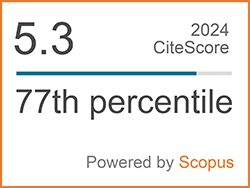Development of a New MEWMA – Wilcoxon Sign Rank Chart for Detection of Change in Mean Parameter
Abstract
Keywords
[1] S.-H. Kim and J. R. Wilsonin, “A discussion on ‘Detection of intrusions in information systems by sequential change-point methods’ by Tartakovsky, Rozovskii, Blažek, and Kim,” Statistical Methodology, vol. 3, pp. 315–319, 2006.
[2] B. Mason and J. Antony, “Statistical process control: An essential ingredient for improving service and manufacturing quality,” Managing Service Quality: An International Journal, vol. 10, pp. 233–238, 2000.
[3] R. R. Sitter, L. P. Hanrahan, D. De Mets, and H. A. Anderson, “A monitoring system to detect increased rates of cancer incidence,” American Journal of Epidemiology, vol. 132, pp. 123–130. 1990.
[4] M. Frisén, “Evaluations of methods for statistical surveillance,” Statistics in Medicine, vol. 11, pp. 1489–1502, 1992.
[5] M. Kovářík, L. Sarga, and P. Klímek, “Usage of control charts for time series analysis in financial management,” Journal of Business Economics and Management, vol. 16, no. 1, pp. 138–158, 2015, doi: 10.3846/16111699.2012.732106.
[6] M. Aslam, A. Shareef, and K. Khan, “Monitoring the temperature through moving average control under uncertainty environment,” Scientific Report, vol. 10, no. 1, 2020, Art. no. 12182, doi: 10.1038/ s41598-020-69192-8.
[7] M. Aslam, A. Shafqat, M. Albassam, J. C. Malela- Majika, and S. C. Shongwe, “A new CUSUM control chart under uncertainty with applications in petroleum and meteorology,” PLoS One, vol. 16, no. 2, 2021, Art. no. e0246185, doi: 10.1371/journal.pone.0246185.
[8] W. A. Shewhart, Economic Control of Quality of Manufactured Product. New York: D. Van Nostrand Company, 1931.
[9] D. C. Montgomery, Introduction to Statistical Quality Control Case Study. New York: John Wiley and Sons, 2008.
[10] E. S. Page, “Continuous inspection schemes,” Biometrika, vol. 41, pp. 100–144, 1954.
[11] S. W. Roberts, “Control chart tests based on geometric moving average,” Technometrics, vol. 1, pp. 239–250, 1959.
[12] M. B. C. Khoo, “A moving average control chart for monitoring the fraction nonconforming,” Quality and Reliability Engineering International, vol. 20, pp. 617–635, 2004.
[13] M. B. C. Khoo and V. H. Wong, “A double moving average control chart,” Communication in Statistics – Simulation and Computation, vol. 37, pp. 1696–1708, 2008.
[14] A. K. Patel and J. Divecha, “Modified exponentially weighted moving average (EWMA) control chart for an analytical process data,” Journal of Chemical Engineering and Materials Science, vol. 2, no. 1, pp. 12–20, 2011.
[15] S. Sukparungsee, Y. Areepong, and R. Taboran, “Exponentially weighted moving average – moving average charts for monitoring the process mean,” Plos One, vol. 15, no. 2, 2020, Art. no. e0228208, doi: 10.1371/journal.pone.0228208.
[16] N. Saengsura, S. Sukparungsee, and Y. Areepong, “Mixed moving average-cumulative sum control chart for monitoring parameter change,” Intelligent Automation and Soft Computing, vol. 31, no. 1, pp. 635–647, 2022, doi: 10.32604/ iasc.2022.019997.
[17] S. F. Yang, J. S. Lin, and S. W. Cheng, “A new non parametric EWMA sign control chart,” Expert Systems with Applications, vol. 38, no. 5, pp. 6239–6243, 2011, doi: 10.1016/ j.eswa.2010.11.044.
[18] R. Amin and A. J. Searcy, “A nonparametric exponentially weighted moving average control scheme,” Communication in Statistics-Simulation and Computation, vol. 20, no. 4, pp. 1049–1072, 1991.
[19] M. Aslam, M. A. Raza, M. Azam, L. Ahmad, and C.-H. Jun, “Design of a sign chart using a new EWMA statistic,” Communications in Statistics - Theory and Methods, vol. 49, no. 6, pp. 1299–1310, 2020, doi: 10.1080/03610926. 2018.1563163.
[20] R. Taboran and S. Sukparungsee, “An enhanced performance to monitor process mean with modified exponentially weighted moving average – signed control chart,” Applied Science and Engineering Progress, vol. 15, no. 4, 2022, Art. no. 5532, doi: 10.14416/j.asep.2021.10.013.
[21] M. A. Raza, T. Nawaz, and D. Han, “On designing distribution-free homogeneously weighted moving average control charts,” Journal of Testing and Evaluation, vol. 48, no. 4, pp. 3154– 3171, 2020, doi: 10.1177/ 0142331220973569.
[22] R Foundation for Statistical Computing, “R: A language and environment for statistical computing,” 2021. [Online]. Available: http:// www.R-project.org/
DOI: 10.14416/j.asep.2022.05.005
Refbacks
- There are currently no refbacks.
 Applied Science and Engineering Progress
Applied Science and Engineering Progress







